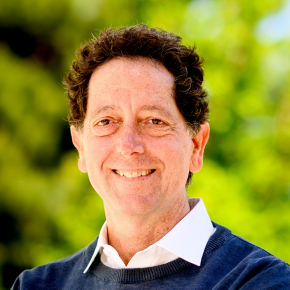CNRS Chemistry welcomes Kevan Shokat as an Ambassador in Chemical Sciences
On November 12th 2024, Kevan Shokat, Professor of Chemistry and co-chair of the Department of Cellular and Molecular Pharmacology at the University of California, San Francisco, will start a series of lectures in several CNRS laboratories as the Ambassador in Chemical Sciences in France. Professor Shokat’s research group focuses on the development of novel chemical tools to decipher signal transduction pathways on a genome-wide scale. These pathways play a crucial role in numerous biological functions and are controlled by specific families of enzymes like protein kinases. Professor Shokat and his colleagues engineer these enzymes and related small molecule inhibitors to develop innovative treatments for diseases like cancer, asthma, and neurological disorders.
What initially sparked your interest in bio-organic chemistry and how did it shape your research career?
As an undergraduate student at Reed College, I became fascinated with organic chemistry. When I then learned about biochemistry and enzymes, I realized that nature is a fantastic chemist and became interested in biological chemistry. During my PhD with Peter Schultz at UC Berkeley, I learned that there are ways to re-engineer biological systems using chemistry. I specifically worked on making antibodies into enzymes. This merging of engineering principles from chemistry, biology and medicine became my passion. I wanted to learn about the immune system and carried out my post-doctoral studies with Chris Goodnow at Stanford. He taught me about signal transduction pathways controlled by kinases, which was just being defined at that time. When I started my own lab at Princeton University, I returned to my passion for organic chemistry and merged it with my new interest in signal transduction pathways.
How do you expect small molecule inhibitors targeting engineered enzymes like protein kinases will help to cure a wide range of human diseases in the future?
Protein kinases are the largest family of enzymes in the human genome. Over the last 50 years, the field has identified specific kinases responsible for about 50 different types of cancer. Drugs which target these kinases have yielded breakthroughs in cancer therapy because they attack the cause of the cancer. There are currently 70 approved kinase inhibitors and many more are under clinical investigation, mostly in cancer. Kinases are also important contributors to immune disorders like inflammation and autoimmunity. These diseases are just starting to be treated with kinase inhibitors. My current research focusses on another family of enzymes, called the GTPases.
Much like kinases, GTPases are involved in cellular signalling. One in particular, called K-Ras, is the cause of many cancers. For almost three decades, it was considered “undruggable”, meaning we did not know how to make a drug against it. In 2013, my lab overcame this challenge and identified a starting point for a drug to treat these cancers. In 2021 and 2022, two drugs treating a specific K-Ras mutant in lung cancer were approved. We are continuing to develop new ways to treat K-Ras tumors and there are many ongoing clinical trials throughout the world that are looking promising in other K-Ras driven diseases such as colon cancer and pancreatic cancer.
As a CNRS ambassador of Chemical Sciences, what are you most looking forward to during your French conference tour?
I look forward to meeting faculty, students and post-docs in the chemical and biological sciences and hearing about their research interests. I hope to find common interests and initiate collaborations between our lab and French scientists that I meet. I look forward to spending an extended time in France, especially Paris, and visiting cities where I have not been so far.
Editor: AVR
Lectures tour
- 12/11/2024 - Paris - Laboratoire de chimie et biochimie pharmacologiques et toxicologiques / laboratoire Chimie biologique pour le vivant (Laurent Micouin et Paola Arimondo)
- 13/11/2024 - Saclay - Institut de chimie moléculaire et des matériaux d'Orsay (Dominique Guianvarch)
- 14/11/2024 - Lille - Centre d'infection et d'immunité de Lille (Oleg Melnyck)
- 15/11/2024 - Strasbourg - laboratoire Chémo-biologie synthétique et thérapeutique (Alain Wagner)
- 18/11/2024 - Montpellier - Institut des biomolécules Max Mousseron (Marie Lopez)
